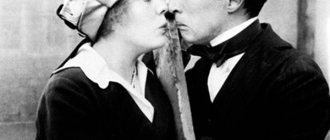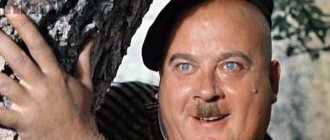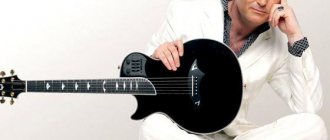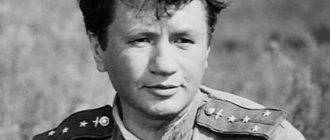Look around and try to find a person who doesn’t know what beautiful Odessa is? All residents of our country have heard “For Odessa” at least once. Some have been there and breathed in its special air, others love it and know it from books, films and songs. As they say in Odessa: “Do you want songs? I have them!” And the first musician and singer who comes to mind is, of course, Leonid Utesov. The real name of this legendary theater, film and pop artist in all respects is Weissbein, and his real name is Lazar or Leizer. At home they simply called him Ledya, Ledechka.
Childhood in Odessa
The biography of Leonid Osipovich Utesov began on March 22, 1895 (encyclopedias indicate the date March 21) in the city of Odessa. Then, in house number 11 on Triangular Lane, a boy was born who was destined to become famous himself and glorify his city. Many years later, the lane changed its name to Utesova Street.
The Weisbein family (real name Utesov) was large - father and mother raised five children. His father, Joseph (Osip) Kalmanovich, worked as a freight forwarder in the port, his mother, Malka Moiseevna, stood at the helm of her family, ruling all household members (including her husband) with a firm hand. A Jewish mother and wife are “something separate,” so no one rebelled against the matriarchy in the house on Triangular Lane. Ledecchka, apparently, inherited his mother’s tough temperament, which could not but be reflected in his fate. But if Malka Moiseevna directed her character towards solving family issues - managing her husband and children, victorious battles with merchants on Privoz, then Ledia splashed it out on those around her outside her father’s house.
Firstly, he fought a lot and successfully, and even became a kind of celebrity in the boyish society of Odessa. Secondly, Ledia Weisbein became the only student expelled from the Faig Commercial School, an institution famous for its liberal practices. In those days, Jews (and the real name of Utesov, as we remember, is Jewish) could only make up 5% of the total number of students in any educational institution in Russia. And only Faig had permission to accept 50% of the sons of the chosen people. Ledia Weisbein (Utesov's real name) either hit or poured ink on one of the teachers and was expelled from the walls of the educational institution forever. Soon the young hooligan hired himself into Borodanov’s traveling circus as a “poster writer” and left the city.
Family and childhood
The actor's real name is Lazar Iosifovich Weisbein, he was born on March 9 (March 21, new style) 1895 in Odessa. The boy was born together with his twin sister, who was named Polina. In total, the family of Joseph Kalmanovich and Malka Moiseevna Weisbein had nine children, four of whom died. The brother and sisters of Lazar and Polina were older than the twins.
Leonid Utesov in his youth
As a child, the boy wanted to become a fireman or a ship captain, but then his neighbor, a violinist, turned him on to music. While studying at the Feig Commercial School, where Lazar was enrolled at the age of eight, the future artist already played several musical instruments beautifully and sang in the orchestra. The young man was not lucky enough to graduate from school; he was expelled for absenteeism and poor academic performance at the age of 14. According to one version, the future artist was expelled from the school for mischief and tricks.
Nomadic life
At the circus, he learned to walk a tightrope, work on a trapeze, and make the audience laugh in the form of a “red-haired clown.” After traveling around cities and villages, in 1912 Ledya returned to Odessa and went to work at the Comedy and Farce Theater under Skovronsky. However, he set a condition: “No Weisbeins” (Utesov’s real surname) - and advised him to choose a more exalted surname. The young artist took the advice literally and began to choose a pseudonym for himself that was consonant with the names of the hills: Skalov, Gorin, Gorsky and, finally, Utesov. At the same time he changed Ledia to Lenya.
From now on, Utesov’s true surname will be known only in a narrow home circle. The country will recognize and love him under his new “exalted” surname.
History of the pseudonym
Leiser's good friend, the famous artist Skavronsky, advised him to take a new stage name.
As Utyosov later recalled, he certainly wanted the pseudonym to have something of natural sublimity. But by that time both the artist Gorov and Skalov were in Odessa. He categorically did not like the surname Kholmov; it smelled of something graveyard-like.
And so the future artist stood on the Spar and remembered what else existed besides rocks and hills. The gaze fell on the fisherman's hut, standing on the cliff. And then it dawned on him: here it is, a new pseudonym.
Utyosin? No, it's too small. Utesov! The unpronounceable Hebrew name was replaced by Leonidas. The new stage name reflected all the power and greatness of the artist.
“What do you call the boat...”
In 1913, the newly minted Leonid Utesov (his real name will never appear on theater posters again) entered the Theater of Miniatures, located in the city of Kremenchug. Here the theater career took off.
The young artist released a benefit performance entitled “From Tragedy to Trapeze.” The performance went on for many hours in a row. First, Leonid acted out a scene from a dramatic play, then sang an act from an operetta, then performed the part of the first violin in a violin trio, after which he performed a pantomime. But that's not all. Next came satirical couplets, a humorous story, dance, romance, parody, juggling, and in the finale - flying on the trapeze. He was received very well, especially in Odessa. The famous king of the underworld, Misha Yaponchik (Vinnitsky is his real name), became a big fan of the young artist’s versatile talent. He helped Leonid Utesov more than once in matters related to his (Mishkin’s) “department.”
Theater life
Leonid Utesov acted in many theaters: the Bolshoi and Small Richelieu Theaters, the Miniature Theater of the city of Kherson, and the traveling theater "Mosaic". In addition to the theater stage, the young actor performed on the stage. In 1917, he became the winner of a couplet competition held in Gomel. In 1919, he played a small role in the film “Lieutenant Schmidt – Freedom Fighter.”
In the twenties, Utesov and his family moved first to Moscow and then to Leningrad. He moved from one theater to another, never staying anywhere for long.
Carier start
The young man’s talent was enough to start a career as an artist in a traveling circus. Since 1911, Lazar performed in Borodanov’s booth, while simultaneously learning to play the violin. In 1912, he was invited to the Kremenchug Theater of Miniatures, where the actor worked under the pseudonym Leonid Utesov. The name change was necessary at the request of the authorities. The actor wanted to have a last name that no one had heard before, and he invented it himself. In just a few years, the young man managed not only to show rapid creative growth, but also to visit many large cities of his homeland. During a tour in Zaporozhye, the artist met his future wife.
Leonid Utesov in his youth
In 1917, Utesov became the winner of a couplet competition in Gomel. The victory encouraged him to gather a small orchestra in Moscow and perform with it in the Hermitage garden. During the Civil War, the famous Odessa resident worked in his hometown, participated in comedy productions, and performed in the operetta theater. It is believed that the artist’s patron at that time was the famous Odessa crime boss Mishka Yaponchik (Mikhail Vinnitsky). Utesov speaks positively about him in one of his early autobiographical books. Contemporaries claim that Mishka Yaponchik was on friendly terms with Leonid Osipovich. Utesov was also friends with Isaac Babel, the author of “Odessa Stories”, which was based on the story of the criminal life of Odessa at the beginning of the 20th century.
Creation of a jazz orchestra
This “fluttering” continued until 1928, when Leonid Utesov finally found his main love - jazz. This happened during a trip with my family to Paris. There he attended a performance by an American jazz orchestra conducted by Ted Lewis and was delighted with what he saw and heard. Returning to his homeland, Leonid managed to organize his own jazz orchestra, which he called “Thea-jazz”. Then the name changed several times (State Jazz Orchestra of the RSFSR, State Variety Orchestra of the RSFSR), but the main thing was that the group managed to play jazz in Soviet Russia, which was, to put it mildly, wary of musical trends like this.
At first, the orchestra mainly performed foreign compositions, but soon the basis of its repertoire was formed by specially written songs and instrumental pieces. Isaac Dunaevsky, a personal friend of Leonid Utesov, became his favorite author.
Biography of Leonid Utesov
In 1912 he entered the Kremenchug Theater of Miniatures, and then took the stage name “Utesov”. Since 1913, the actor played in the Odessa troupe of Rozanov (Bolshoi and Maly Richelieu Theaters), the Kherson Theater of Miniatures, and the traveling theater of miniatures "Mosaic".
In 1917, Leonid Utesov took first place in a couplet competition in Gomel and in the same year organized a small orchestra in Moscow, with which he performed in the Hermitage Garden.
In 1919, Leonid Utesov made his cinematic debut - the actor starred as lawyer Zarudny in the film “Lieutenant Schmidt - Freedom Fighter.”
From 1921 to 1928, Leonid Utesov played at the Moscow Theater of Revolutionary Satire, the Musical Comedy Theater, the Palace Theater, the Leningrad Free Theater, and the Riga Marine Theater.
In 1925, Leonid Utesov starred in two films by Boris Svetlov - the comedy “Spirka Shpandyr’s Career” and the drama “Aliens”.
In 1928, during a trip to Paris, Utesov heard professional jazz for the first time, gathered musicians and began preparing a jazz program. On March 8, 1929, Leonid Utesov’s theatrical jazz “Thea Jazz” debuted on the stage of the Maly Opera Theater in Leningrad, which later became known as the State Variety Orchestra of the RSFSR. This was a completely new genre for the stage of that period. Utesov combined conducting with entertaining, dancing, singing, playing the violin, and reading poetry. The musicians acted out various scenes between themselves and the conductor. The entire performance was unified by the director, starting with the introduction to the audience and ending with the farewell song “Bye,” which was broadcast using a movie screen and loudspeakers installed on the façade of the concert building.
The second program of the Utesov orchestra was called “Jazz on the Turn”, was released in 1930 and consisted of orchestral fantasies on the themes of folk songs and four rhapsodies written by Isaac Dunaevsky.
In 1933, the play “Music Store” (authors Nikolai Erdman, Vladimir Mass) appeared in the repertoire of Utesov’s group, which was a series of small comic episodes that took place in a music store during the working day. In one of the scenes, the orchestra parodied jazz, performing the aria of an Indian guest from Rimsky-Korsakov’s “Sadko,” “The Heart of a Beauty” from Giuseppe Verdi’s “Rigoletto,” and some themes from Pyotr Tchaikovsky’s “Eugene Onegin,” arranged by Dunaevsky in a foxtrot rhythm. The success of the jazz interpretation of classical works largely determined the content of the orchestra’s next program, “Carmen and Others,” in which comically played out episodes of the famous opera were accompanied by revised music by Bizet.
A real breakthrough for the artist and his ensemble came in 1934, when Grigory Alexandrov’s film “Jolly Fellows” was released on cinema screens, in which Utesov’s entire orchestra starred. The general mood of the film was determined by Dunaevsky’s songs based on the poems of Lebedev-Kumach: “Heart, you don’t want peace” and “March of the Merry Children” performed by Leonid Utesov. The Congress of Peace and Friendship with the USSR, held in London in 1937, ended with the “March of the Cheerful Children.”
In 1937, the Utesov jazz orchestra presented a new program, “Songs of my Motherland.” The first part of the program included songs about the Civil War (“Tachanka”, “Polyushko”), the second consisted of lyrical and comic songs. The program lasted for several years, until the Great Patriotic War.
During the first year of the war, the orchestra gave over 200 concerts in factories, ships, and in the army on the Kalinin Front, constantly including new songs in the program: “Wait for me,” “Dugout,” “Dark Night,” “Odessa Bear,” satirical anti-fascist ditties “There is no mercy for the bastards!”
The second program of the war years was a response to the beginning of serious successes of the Soviet army. It included the following songs: “Farewell”, “Steamboat”, “Ten Daughters”, “Two Friends”. On May 9, 1945, in front of a huge crowd of people, Leonid Utesov performed with an orchestra on an open stage on Sverdlov Square in Moscow.
For the 800th anniversary of Moscow (1947), Utesov’s orchestra prepared an orchestral fantasy “Moscow”. At the end of the program, Dunaevsky’s song “My Dear Muscovites!” was performed for the first time.
In 1952, the program “Music of the Fat People” appeared, the central place of which was occupied by satire on international topics. The 25th anniversary of the group in 1954 was celebrated with the variety show “Silver Wedding,” in which, among others, Utesov performed one of Dunaevsky’s last works, “I Gave Everything to the Song.”
In March 1960, the program “Thirty Years Later” was presented at the Moscow Variety Theater. In it, along with the usual repertoire, the orchestra performed complex classical works - Sergei Prokofiev’s march from the opera “The Love for Three Oranges” and Debussy’s play Reverie. The difference from Western dance jazz was emphasized by the parody number “The Evolution of Western Dance.”
In 1961, at the age of 66, Leonid Utesov decided to leave the stage. In subsequent years, he wrote a book, led an orchestra, acted a lot on television, but almost never performed himself. In December 1981, Leonid Utesov's last performance took place. Leonid Utesov died on March 9, 1982 in the Arkhangelskoye sanatorium near Moscow. He was buried at the Novodevichy cemetery.
Leonid Utesov wrote the books “Notes of an Actor” (1939), “With a Song through Life” (1961), “Thank you, heart! Memories, meetings, reflections" (1976).
Another book was published posthumously - “Forgive-farewell, Odessa-mama!” (2003).
Leonid Utesov - People's Artist of the USSR (1965). He became the first pop artist to be awarded this title.
Utesov was awarded the Order of the October Revolution (1975), two Orders of the Red Banner of Labor (1945, 1980), medals “For valiant labor in the Great Patriotic War of 1941-1945”, “For victory over Germany in the Great Patriotic War of 1941-1945” ." and etc.
On September 2, 2000, a monument to Leonid Utesov was unveiled in Odessa (sculptor Alexander Tokarev, architect Vladimir Glazyrin). In St. Petersburg (Mayakovskogo Street, 21) and Moscow (Karetny Ryad Street, 5/10), memorial plaques were installed on the houses where Utesov lived.
Triangular Lane in Odessa, where the singer was born and lived, was renamed Utesov Lane after his death.
The asteroid (5944) Utesov, discovered by astronomer Lyudmila Karachkina at the Crimean Astrophysical Observatory on May 2, 1984, is named in honor of Utesov.
Leonid Utesov was married twice: from 1914 to Elena Osipovna Lenskaya (1892-1962) and from 1982 (during the last two months of his life) to Antonina Sergeevna Revels (1923-1997). The daughter from his first marriage, Edith Utesova (1915-1982), was a soloist of his orchestra. Utesov performed many songs in a duet with her, in particular, the widely known “My Dear Muscovites.”
The material was prepared based on information from open sources
War and post-war years
During the Great Patriotic War, Leonid Utesov traveled a lot with concerts to the front, more than once came under bombing and shelling, but continued to perform for the soldiers.
When the war ended, Utesov’s orchestra toured the country a lot, morally supporting his compatriots, because, as his song says: “The song helps us build and live.” In subsequent years, the group continued active concert activity, began performing on radio and television, and recorded records. Utesov’s daughter, Edith, performed with her father and was a soloist in his orchestra.
Music
In 1928, Leonid Osipovich visited Paris and fell in love with jazz there. The musical genre, unknown to the Soviet public, so captivated the artist that in 1929 he presented his own theatrical jazz program with the orchestra. In 1930, a new concert was prepared, in which Utesov included the orchestral fantasies of Isaac Dunaevsky. In 1934, the film “Jolly Fellows” was released, where Leonid Osipovich starred together with the musicians of his orchestra. Aspiring film actress Lyubov Orlova played with the singer in the film. In 2010, the first Soviet jazz comedy with Utesov was shown on television in a restored color version. The famous song “Heart”, performed by Utesov in this film, was written by Isaac Dunaevsky long before filming.
Leonid Osipovich's repertoire includes hundreds of compositions. Some songs are best known because of the stories associated with them. In 1935, the composition “From the Odessa Kichman” performed by Utesov became a national hit. That period of Soviet times was particularly tense due to Stalin's repressions. The singer delayed performing the frivolous song after receiving a warning from the authorities. However, at a reception in honor of the rescue of the polar explorers of the icebreaker “Chelyuskin,” Utesov performed the composition “From the Odessa Kichman” in the St. George Hall at Stalin’s personal request.
There is a version that Isaac Dunaevsky wrote the song “Once Upon a Brave Captain” for Leonid Osipovich in 1936, but it was not included in the singer’s repertoire. In 1937, the artist presented the program “Songs of My Motherland” to the public and introduced his daughter Edith into his musical group as a soloist. In 1939, the artist became the first performer in the USSR to star in a music video. In 1941, the Great Patriotic War began, and Utesov switched to songs of a military-patriotic nature. In a matter of months, the musicians selected a new repertoire and went to the front with the musical program “Beat the Enemy” to support the soldiers of the Red Army.
In the first year of its tour, the orchestra gave more than 200 concerts. In 1942, Leonid Utesov was awarded the title of Honored Artist of the RSFSR. The orchestra continued to tour with a military-patriotic repertoire until the end of the war, the most popular compositions of that time: “Wait for me”, “Katyusha”, “Song of War Correspondents”, “Odessa Bear”, “Soldier’s Waltz”. Leonid Osipovich was among the artists participating in the festive concert in Moscow on May 9, 1945.
In 1947, Utesov's jazz group was renamed the Variety Orchestra of the RSFSR. During the same period, the orchestral fantasy “Moscow” was presented, prepared for the celebration of the 800th anniversary of the capital. In 1951, the song “By the Black Sea” appeared, which became the calling card of Odessa. It was written for Utesov by Modest Tabachnikov and Semyon Kirsanov. In the post-war period, the RSFSR Variety Orchestra under the direction of Leonid Osipovich continued to present new musical numbers. In the early fifties, Edith Utyosova left the group, and 10 years later her father also left the stage. In 1965, Leonid Osipovich was awarded the title of People's Artist of the USSR.
In his declining years
In 1962, his wife Elena died. Despite the long-term parallel relationship with Antonina Revels, surviving the death of such a loved one turned out to be a difficult ordeal for Leonid Osipovich.
He stopped performing and simply leaving the house unless absolutely necessary. Faithful Antonina remained close, but Utesov invited her to officially marry only 20 years later, after the death of her daughter in 1982 from a serious illness. However, the happiness was short-lived. A few months later, Leonid Osipovich died at the age of 87.
Despite the fact that Utesov lived most of his life in Leningrad, he always remained an Odessa resident. And now, 30 years after his death, remembering this man, we see sunlit streets, feel the salty wind from the sea on our lips and hear:
“There is a city that I see in a dream, Oh, if you only knew how dear the city that appeared to me in the blooming acacias is by the Black Sea...”
Memory and legacy
Utesov became a truly iconic figure in the history of Soviet art. Many television programs have been filmed about his life and work. After the singer’s death on March 9, 1982, a huge archive of photos, letters, recordings, books and personal belongings remained. Many valuable artifacts were lost, but some of the correspondence and family photographs were preserved by the artist’s niece. On her initiative, the Leonid Utesov Museum was opened. Currently, the exhibition has been greatly expanded thanks to the efforts of Eduard Amchislavsky. The apartment museum is located in Odessa in the house of Utesov’s childhood and youth.
Monument to Leonid Utesov in Odessa | Official website of Odessa
Leonid Osipovich wrote four autobiographical books in which he shared his memories and thoughts. One of the streets in his hometown and an asteroid are named after him. The discography of Utesov's selected songs includes more than 10 CDs. Leonid Osipovich was buried at the Novodevichy cemetery in Moscow.










